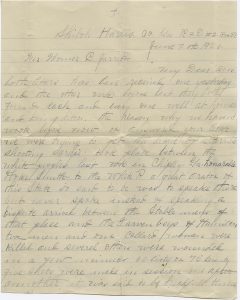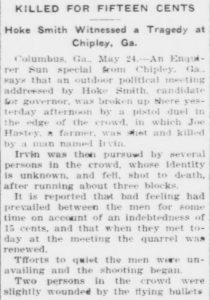By Susan Martin, Senior Processing Archivist
This is the third installment of a five-part series on the Jarrett family letters at the Massachusetts Historical Society. Click here to read Part I and Part II.
I’m really enjoying learning about the Jarrett family of Shiloh, Ga., and I hope you are, too. I’ll continue now with the third letter in the Massachusetts Historical Society’s small Jarrett family collection, another long one from Julia Jarrett to her son Homer. Below is a complete transcription. As I’ve done before, I’ll retain misspellings but add sentence and paragraph breaks for readability.

Shiloh. Harris Co. Ga. R.F.D. #2 Box 37
June 7th 1906.
Mr. Homer C. Jarrett
My Dear son
Both letters has ben received, one yesterday and the other wk. before last. They both found each and every one well at home and doing ditto. The reason why we havent wrote before now or answered your letter, we were trying to get the detail of a terrible shooting scrape took place between the white peoples last wk. in Chipley, Ga. Honarable Hoke Smith to the White P. a great orator of this State so said to be was to speake there but never spoke. Instead of speaking a dispute arrived between the Stable mens of that place and the Earven boys of Hamilton. Two men and one collard woman were killed and severel others were wounded. In a few minutes 60 sixty or 75 seventy five shots were made in session one after another. It was said to be dreadfull times there for a few minutes. Dont know if any of the wounded ones are dead or not.
I forgot to tell you in my last letter a few wks. a go Sarand Dowdle old man Barlow Pollard’s daughter had a fit and fell in the fire and burnt both feet. Burnt one [off] and the other cooked. Died day before yesterday. Burried yesterday at 11 OClock.
Uncle John J. Will come home a few days ago. He give Uncle John $60, dollars sixty dollars and a $30,00 thirty dollars suit of Clothes and give little sis $5,00 five dollars, and give little buddie $6,00 dollars six dollars and a rifle and give Cousin Jimmie $10,00 ten dollars give Maxcie and Oler $2,50 two dollars and fifty cents a piece. He come and none of us didnt get to see him. Stayed two nights and one day. When we hard it he had come and gone.
Now the girls you ask of. I cant tell you anything of Miss Imogene Biggs now but in a few Sundays I can tell you all you want to hear of her. You just aught to be here now. Brother Wilson & Charlie both have new top Buggies just broght in about three 3 wks. ago and I am just rideing girls on every hand. We are going to visit Powels Church as soon as we catch up with our works and if she Miss Imogene be there Charlie say he is going to burn her up.
Our Teacher is not a sister to Anna M. Williams. This Willie Williams is the daughter of Henry Williams of Hamilton Ga.
I shall if nothing happen write you a long letter telling you of all the girls and everything at home in short.
Respectfully yours mother
Julia Jarrett.
The Jarretts certainly lived in tumultuous times! I’ll start, as Julia does, with the “terrible shooting scrape.” Hoke Smith (1855-1931), a Georgia lawyer and former editor of the Atlanta Journal, was campaigning to be the Democratic nominee for governor. He was slated to give a speech in Chipley (now called Pine Mountain), a town about eleven miles west of Shiloh, but the event was rocked by a violent confrontation between two local men. I found details of the shooting in one of the historic newspapers digitized and presented online as part of the Library of Congress “Chronicling America” project. Here’s an image of the article with a transcription.

KILLED FOR FIFTEEN CENTS
Hoke Smith Witnessed a Tragedy at Chipley, Ga.
Columbus, Ga., May 24.—An Enquirer Sun special from Chipley, Ga., says that an outdoor political meeting addressed by Hoke Smith, candidate for governor, was broken up there yesterday afternoon by a pistol duel in the edge of the crowd, in which Joe Hastey, a farmer, was shot and killed by a man named Irvin.
Irvin was then pursued by several persons in the crowd, whose identity is unknown, and fell, shot to death, after running about three blocks.
It is reported that bad feeling had prevailed between the men for some time on account of an indebtedness of 15 cents, and that when they met today at the meeting the quarrel was renewed.
Tfforts [sic] to quiet the men were unavailing and the shooting began.
Two persons in the crowd were slightly wounded by the flying bullets.
The man named Irvin who died that day (incidentally the day before his 23rd birthday) was Virgil H. Irvin. His tombstone reads: “Gone but not forgotten.” The man Irvin killed was 34-year-old Joseph Walter Hastey. I couldn’t identify any other individuals shot and/or killed in the incident, including the Black woman mentioned by Julia Jarrett.
Unfortunately, as it so often does, the cycle of violence continued. On 10 June 1906, a man named Theophilus Theodore Murrah, who served on the governor’s staff, was also shot and killed in Chipley. The Atlanta Georgian reported that the murder was committed by Abb (or Ab) Hastey as retaliation for his brother Joe’s death, but I couldn’t determine what, if anything, Murrah had to do with it. Another Georgia newspaper summed up local sentiment: “The series of tragedies has greatly stirred the Chipley community.”
Hoke Smith went on to win the gubernatorial nomination and the office, though he didn’t serve for long. The online New Georgia Encyclopedia has a good article about Smith that touches on some of his efforts to disenfranchise Black Georgians with Jim Crow tactics. As governor, he would sign an act to add a literacy test and grandfather clause to the state’s constitution. This amendment stood until the passage of the Voting Rights Act of 1965.
Julia continued her letter with another horrifying piece of local news, the death of a woman from fire, but the rest of the content is fairly mundane. Most of the handwriting matches that of the previous two letters, which I’m fairly confident means her son Claud transcribed it for her. (The passage about Imogene Biggs seems to be in his own voice.) However, a few sentences in the middle were written by someone else, possibly another of Julia’s children. The next two letters in the collection are written in this second hand, which you’ll see in upcoming posts.
As I mentioned in my last installment, Homer C. Jarrett moved around a lot. This letter was originally addressed to him at Chestnut Street in St. Louis, Missouri, then forwarded to the Algoma Club, 176 Congress Street, Detroit, Michigan. He eventually settled in Boston, Mass., but he hadn’t arrived here yet. Stay tuned for more.

